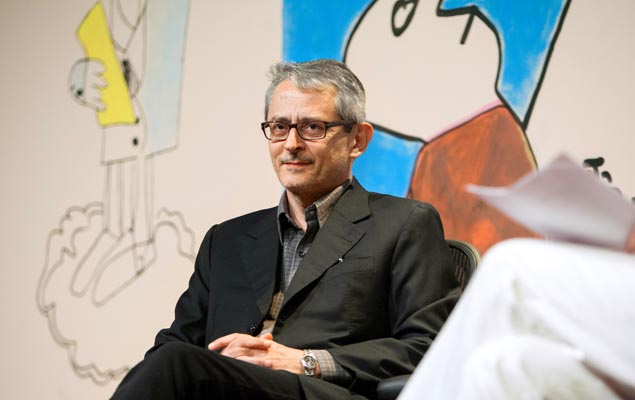Latest Photo Galleries
Brazilian Markets
17h31 Bovespa |
+0,35% | 125.573 |
16h43 Gold |
0,00% | 117 |
17h00 Dollar |
-0,57% | 5,1692 |
16h30 Euro |
+0,49% | 2,65250 |
ADVERTISING
Folha de S.Paulo Editor-In-Chief Otavio Frias Filho dies at 61
08/21/2018 - 08h59
Advertising
SÃO PAULO
Otavio Frias Filho, Folha de S.Paulo's Editor-in-Chief, died this Tuesday at age 61, of pancreatic cancer. Mr. Frias Filho created and executed Projeto Folha, a set of newsgathering and editing guidelines that modernized Brazilian journalism in the 1980s, and led the newsroom for the last 34 years.
Mr. Frias Filho was diagnosed with cancer in September 2017. He died at 03:20 a.m. this Tuesday (21st) at Hospital Sírio-Libanês, in São Paulo.
| Raquel Cunha/Folhapress | ||
 |
||
| Otavio Frias Filho, Folha de S. Paulo's Editor-in-Chief |
He leaves Fernanda Diamant, editor with the literary magazine Quatro Cinco Um, with whom he had two daughters, Miranda and Emilia. He also leaves siblings Maria Helena, a doctor, Luiz, president of Grupo Folha and Maria Cristina, who writes the finance and companies column "Mercado Aberto" (open market).
Under Mr. Frias Filho's stewardship, Folha has become Brazil's largest and most influential newspaper, leading in both print circulation and online viewership, and has kept this leadership ever since. The outlet is now a reference in nonpartisan, pluralistic, independent journalism and imbued with critical thinking.
These principles were recently updated by the 2018 edition of Folha de S. Paulo's Stylebook, another project recently led by Mr. Frias Filho. On February 25th, Mr. Frias Filho wrote, in his monthly column, a piece entitled "Journalism, A Necessary Evil":
"Journalism, despite its severe limitations, is a legitimate form of knowledge of reality's most immediate level. To assurance its autonomy, it has to cultivate a particular set of values, methods and rules."
Even before taking the helm of Folha's newsroom in 1984, Mr. Frias Filho was involved in crucial moments in the newspaper's history, which would culminate in the creation of Folha's editorial guidelines.
In its latest revision, from 2017, the work extols professional journalism as the antidote for fake news and intolerance. "It will be up to outlets akin to Folha to reinforce their role as part of the public arena, where diverse points of view and dialogue despite the differences are always present."
In 1974, at age 17, Mr. Frias Filho was part of the group that, under his father Octavio Frias de Oliveira (1912-2007), decided to open the newspaper's pages to different opinions, including the opposition to the military dictatorship that ruled Brazil at that time.
This call for democratic opening became more pronounced during the Diretas Já, movement in 1983, which demanded direct presidential elections and sparked the end of military rule in Brazil. Folha's role was crucial in this campaign.
In a column published in June 17th, Mr. Frias Filho reaffirmed his optimism regarding Brazilian democracy.
"The path to democracy's labored maturing consolidated a political consciousness among the politicized portions of Brazil's population. This consciousness expressed itself in an unofficial pact of nonviolence, which is now being challenged," he wrote, discussing claims for a new military intervention made by radical groups.
"It comes a moment where the network of social and economic relationships becomes too complex to into the barrack's simpleton logic. There is a point where democracy is the only system able to regulate a society pierced by innumerous contradictory interests."
Born in São Paulo in June 7, 1957, firstborn to Octavio and Dagmar Frias de Oliveira (1925-2008), Otavio Frias Filho earned a bachelor's degree in Law from Universidade de São Paulo, where he also attended graduate-level coursework in Social Sciences. His collected essays are published in several books, among them "De Ponta Cabeça" (upside down, 2000), "Queda Livre" (free fall, 2003) and "Seleção Natural" (natural selection, 2009).
Mr. Frias Filho was also recognized as a playwright. Some of his plays were staged in São Paulo, among them "Típico Romântico" (a typical romantic), "Rancor" (wrath) and "Don Juan". A stage adaptation of "Terceiro Sinal" (beginner's call), a text where he describes his experiences in acting, ran in Teatro Oficina until May, with actress Bete Coelho in the cast.
In the last 12 months, Mr. Frias Filho was on leave from his regular activities in the newspaper, during which he put on hold his daily activities in the newsroom, such as assigning and approving the daily opinion pages, and meeting with the newsroom top management in a weekly basis.
Mr. Frias Filho left two manuscripts ready for publication: children's book "A Vida é Sonho e Outras Histórias para Pensar" (a life is a dream and other stories to think about), and a collection of his recent articles at Folha. He was also working in an autobiography, left unfinished.



